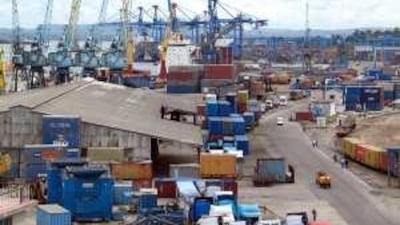In the car-crazy culture of the Middle East, old models go out of fashion quickly and three-year-old sedans and SUVs are soon discarded in favour of the latest car. Traders capitalising on Africa's thirst for goods do brisk business. Buying a car is difficult in many parts of the continent because there are few dealerships and no local car assembly, except for South Africa.
So every year, thousands of used vehicles in the UAE are loaded on to RORO (roll-on, roll-off) vessels and shipped to deepwater ports such as Mombasa in Kenya, where they are taken to Brazzaville in Congo, Juba in southern Sudan, and Uganda and Kenya. The trade in used cars is one example of the critical link the UAE has with emerging African economies. Firms such as Dubai World and its ports subsidiary, DP World, hope to invest billions in Africa across the tourism, ports and mining fields.
Thanks to the UAE's own deepwater ports and international airports such as Jebel Ali and the nearby Dubai International Airport, the country is now a gateway to ship goods throughout the continent. One company, DHL, which also trades in the UAE as Danzas, is seeking to unseat the French firm SDV as Africa's top logistics firm with its Dubai freight-forwarding and warehousing businesses. DHL considers Africa the fastest-growing region after China, according to Enver Moretti, the chief executive of emerging markets at DHL Global Forwarding.
As one of the chief architects of DHL's strategy in Africa, Mr Moretti says he generally travels more than 20 days a month and, despite the risks in some countries, the continent is showing strong growth. In the past five years, he has opened offices in Uganda, Tanzania, Kenya, Nigeria, Ghana, Cameroon, Gabon, Ivory Coast, Senegal, Angola, Congo and South Africa. In the next year, Mr Moretti says he hopes to open more offices in Zambia, Mozambique and the Democratic Republic of the Congo.
In most cases, consumer goods and industrial equipment are shipped from Asia to Danzas's warehouses and freight-forwarding centres in Jebel Ali. From there they are either flown or sent by ship to destinations across the continent. The most common cargos are electronics, spare car parts and pharmaceuticals. DHL's business in Africa has seen growth in the double digits every year, and is now worth roughly ?300 million (Dh1.58bn) a year, he says. That growth is expected to continue, despite the global downturn.
"We can grow our business in the double digits from a logistics and freight-forwarding point of view for the next five years, guaranteed," Mr Moretti says. "That is not happening anywhere else in the world right now. It's difficult today to repeat that, even in the Gulf." For nearly two decades, Africa's prospects have been getting brighter. The continent's GDP has risen steadily since 1992, when its economy shrank by 1 per cent.
Thanks to growing stability and a land rich in oil and mineral resources, Africa had been forecast to grow by 6.3 per cent each year until 2011, according to the IMF. The forecast has since been downgraded, and the IMF now sees 3.25 per cent growth this year for sub-Saharan Africa, although the continent has been somewhat spared from the wider malaise affecting global economies. "Lower global growth has reduced demand for African exports, pushed commodity prices downwards and curtailed the flow of remittances from abroad," the IMF said this year.
"In addition, the tightening of global credit has reduced capital inflows and curtailed the availability of trade finance, and could eventually cause donors to reduce their aid to Africa." Mr Moretti remains bullish and says the continent has made great strides. "In general, Africa has reached a political stability, which is much better than it was 10 years ago." But occasionally, he has to travel by bullet-proof car in some of Africa's most dangerous countries. There have been one or two incidents where his employees were briefly kidnapped and released, or a gunman tried to rob a warehouse.
"It's not always safe, but that is Africa," Mr Moretti says. "Either you love it or you hate it, and I love it." DHL does not incur any risk from pirates because they generally target oil tankers, he says. The company's market share in Africa is still in the single digits but its strategy of setting up its own offices across Africa stands to reap huge dividends for the company, Mr Moretti says. Most freight-forwarding firms have not made the same level of investment and rely on independent agents there, which is often unsuitable for multinational firms with strict requirements.
"If you don't have the network in Africa, you cannot operate in Africa," Mr Moretti says. This has also helped to create new jobs for Africans, something he says is good from a service and corporate social responsibility point of view. "To be successful, you have to hire local people," Mr Moretti says. "You cannot run Gabon with an American guy. But also, I strongly believe our aim is to support Africa, to create more jobs and to find African talent."
DHL has 1,500 employees in Africa. Other global logistics firms with developed networks include SDV of France, and Panalpina, which focuses on carrying material for the energy industry, according to Mr Moretti. SDV has been on the continent longer and is also heavily investing in infrastructure. It also benefits from France's post-colonial presence in the region. "France is investing tens of millions of euros in Africa, and historically they are strong there," Mr Moretti says.
But with DHL's extensive logistics and warehousing centres in Dubai, coupled with its expanding footprint across the continent, he says that could be about to change. igale@thenational.ae

